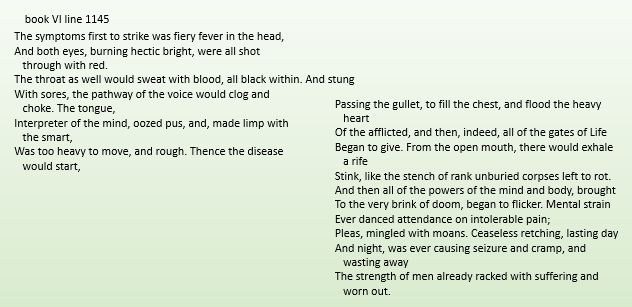

 |
Page
32
|
|
The symptoms first to strike was fiery fever in the head, The tongue, Interpreter of the mind, oozed pus, and, made limp with the
smart, This goes on for pages and pages and then the poem suddenly stops. This was not because he had caught the plague as we know he died from ingesting some sort of elixir. Maybe he stopped out of sheer despair or maybe he did not stop but the rest of his poem was lost. So how do we sum up the importance of this work of Lucretius? He was very influential. I think this is because his philosophy is directly
rooted in our daily lives. Lucretius was trying to explain the physical
word. His poem encompasses a range of subjects: nutrition, perception
of mental illness, cosmology, the seasons, eclipses. thunder, clouds,
the properties of magnets, the emergence and evolution of animal and plant
life, poisoning and contagious disease, especially the plague. He discusses
things we experience and wonder about and many of his ideas are close
to modern scientific thinking. The great philosopher Socrates (470BC)
tried to answer the questions what is virtue? what is patriotism? what
do you mean by morality? He could never provide answers whereas
Lucretius asked questions to which he could provide answers. Socrates
and his followers could not differentiate fact from fiction, that history
is different from myth and that philosophy and theology are totally different
from the natural word. Plato (~420BC) was a student of Socrates and founded
an Academy for philosophic thought in Athens. He is the only early philosopher
whose entire work survives. In contradiction to Lucretius he firmly believed
in the immortality of the soul and the afterlife . He wrote in dialogues
in which he discussed knowledge and opinion, perception and reality,
nature and custom, and body and soul. He also believed Homer’s
Iliad to be divinely inspired and could govern the way we live if only
it could be interpreted correctly. It would function as the Bible does
today. That was the prevailing philosophy when Lucretius was rediscovered
and his materialism was a shock. Lucretius appealed to the common man
but Plato’s metaphysics set him at odds with the common man. He says
you do not have to hold something in your hand for it to be real. Lucretius’
Epicurean ideas effectively supplanted the dominant Aristotelian ideas
and became the bedrock of Scientific thought.
That completes my survey of book talks not all of which have even been presented as talks. After 20 years of volunteering at Charlecote this is my swansong. The Covid pandemium is having a devastating effect on the National Trust with properties shut and losses amounting to 200 million pounds. A large reduction in staff numbers will be necessary and it will be regarded as no longer safe for volunteers over 70, which is surely a large proportion of us. So my Charlecote days are over but I have many very happy memories and have met so many wonderful people. Two in particular are Jess Wolverson and Alex Parré. Together we explored the library and Alex is a collector of old books and was the source of a wealth of knowledge. I thank them both. Len Mullenger 30-7-2020 |